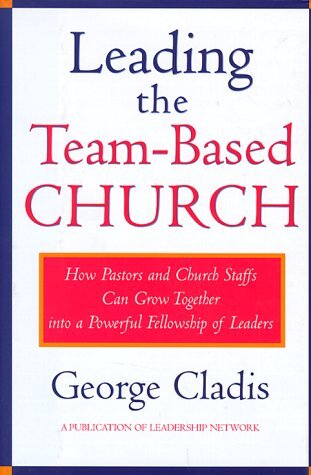George Cladis, Leading the Team-Based Church: How Pastors and Church Staffs Can Grow Together into a Powerful Fellowship of Leaders. Jossey-Bass, 1999.
Referenced in: Ministry Staff and Leadership Teams
LifeandLeadership.com Summary
Directed to staff teams, but still quite valuable on the functioning of teams in the overall ministry of the church. Cladis begins with a theology for team ministry based on a perichoretic image of the Triune God as a choreographed community. He suggests this is a model of ministry teams in the postmodern world that may be expressed in seven attributes of healthy leadership teams.
- First, teams engage in a covenant community whose essence is love.
- Second, just as God sovereignly moves history toward a particular goal, so ministry teams must have a clear, visionary sense of divine mission.
- Third, just as the Trinity’s community of covenant love works to form a culture, or kingdom, of God, so ministry teams create a kingdom culture that reinforces their mission and becomes the basis for the congregation’s culture.
- Fourth, just as there is no competition but only perfect harmony and community among the persons of God, so ministry teams collaborate by freely offering their gifts for ministry and receiving from God a spiritual synergy resulting from the team member’s collaboration.
- Fifth, just as the perfect community of God implies perfect trust, so ministry teams learn to trust one another and model trustworthiness.
- Sixth, just as it is the nature of God to pour out self, to extend grace, to give up life for us, so ministry teams function to give themselves away, i.e. give away responsibility and empower others so that they develop into all God wants them to be.
- Seventh, although God is all knowing, he constantly reveals himself to us.
Thus, ministry teams must be growing and learning, discovering and experiencing the revealed presence of God and being progressively shaped by the Spirit into the image of God. Cladis develops each of these even characteristics and shows how this has worked in a variety of real ministry settings. This book is gem.
From the Publisher
Few responsibilities bedevil church leaders like that of managing a church staff. Faced with staff tension, rivalry, and dramatically high turnover rates, leaders often discover that the reality of day-to-day life in the church office bears little resemblance to their preconceptions regarding how a church should operate. Concerned that fallout from conflict might soon seep into a thriving congregation, church leaders begin searching for solutions that will help them revitalize their staff and ultimately invigorate their congregation. Seeking guidance, they look to themselves, and to God, for answers-answers that can be found embedded in the essence of Christian theology.
In Leading the Team-Based Church, George Cladis issues a clarion call for ministry teams to embrace a fresh leadership model that is not based on hierarchy, but on a process of collaboration that mirrors the relationship of Father, Son, and Holy Spirit. He reminds us that today’s cultural environment-where authority has basis in trust, innovation reaps rewards, and spirituality takes root in life and work-has matured past the need for the hierarchy of traditional church leadership where the pastor had the final say. Through down-to-earth stories from his own experience and those of clergy in both mainline and evangelical churches, Cladis offers an exciting alternative to the traditional forms of church leadership, enabling pastors, congregational leaders, and staff to breathe new life into their ministries and unleash the full potential of the entire ministry team.
Cladis, pastor of a fast-growing mainline congregation, demonstrates how cultural changes affecting all our institutions-not just the church-are making it easier to adopt this new model of leadership. Even the business world, Cladis argues, has created a modern workplace that parallels Trinitarian theology. Is it any secret that the most successful corporations have been built through the creation of dynamic teams that recognize the unique gifts of their employees, cultivate collaboration, mutual respect, empowerment, and are fueled by a common goal? Cladis’s practical advice will enable ministry teams to work together in ways that both embody the Christian message and call forth the full creativity and love of the entire team. Showing how various innovators in organization and business reform are embodying key theological principles in their work, Cladis identifies seven of these principles that can give a spiritual dimension to team formation.
From this theological model, ministry teams can derive practical ways to lead effective congregations, build vibrant ministries, and serve as a catalyst for spiritual renewal in today’s world.
About the Author
George Cladis is the new pastor of Noroton Presbyterian Church in Darien, Connecticut. Until this summer, he was pastor of Covenant Presbyterian Church in Austin, Texas. During his ten years at Covenant, he oversaw a period of dramatic growth during which membership doubled from 800 to 1600 and attendance tripled, to an average of 1100 worshippers each Sunday. He managed a staff of 13 full-time and 20 part-time people.
***For additional information on this resource, including reviews, click the bookstore links. Check the reference at page top or the links below for resource guides on related topics.***
See Resources on Over 100 Areas of Ministry Leadership:


